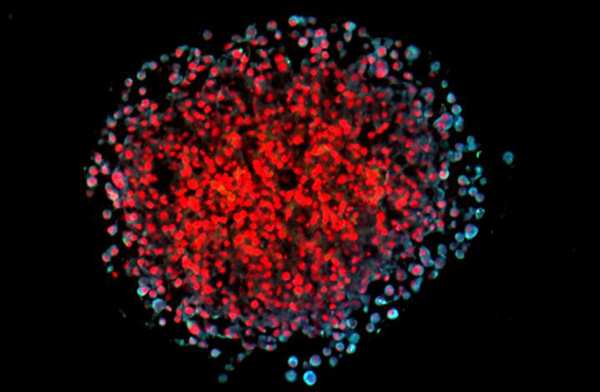
The FDA has granted its first-ever approval for an immunotherapy regimen for breast cancer to the combination of Tecentriq® (atezolizumab), marketed by Genentech, a member of the Roche Group, and Celgene’s chemotherapy Abraxane® (paclitaxel protein-bound particles for injectable suspension [albumin-bound]; nab-paclitaxel), Genentech and Roche said.
The Tecentriq-Abraxane combination was approved as a treatment for adults with unresectable locally advanced or metastatic triple-negative breast cancer (TNBC) in people whose tumors express PD-L1, as determined by an FDA-approved test. The FDA also authorized such a test, authorizing Roche’s VENTANA PD-L1 (SP142) Assay as the first companion diagnostic for the combination therapy to gain agency approval.
“This Tecentriq combination is the first cancer immunotherapy regimen to be approved in breast cancer, representing a meaningful step forward in the understanding of this disease,” Sandra Horning, MD, Genentech chief medical officer and head of global product development, said in a statement. “The FDA approval of this Tecentriq combination is an important treatment advance for people with PD-L1-positive, metastatic triple-negative breast cancer, a disease with high unmet medical need.”
The FDA granted accelerated approval to the Tecentriq-Abraxane combination a day ahead of its PDUFA or Prescription Drug User Fee Act target date for a decision. Through its Accelerated Approval Program, the FDA allows conditional approval of a medicine deemed to fill an unmet medical need for a serious or life-threatening disease or condition.
Genentech said a study to confirm clinical benefit for Tecentriq-Abraxane is ongoing. Continued approval for the indication may be contingent upon verification and description of clinical benefit in the confirmatory trial, the company acknowledged.
The FDA based its decision on positive progression-free survival (PFS) data from the Phase III IMpassion130 trial (NCT02425891). The data showed that Tecentriq plus nab-paclitaxel significantly reduced the risk of disease worsening or death by 40% compared with nab-paclitaxel alone—a median PFS of 7.4 months, vs. 4.8 months—in PD-L1-positive patients with unresectable locally advanced or metastatic TNBC who had not received prior chemotherapy for metastatic disease.
Beyond chemotherapy

IMpassion130 was designed to assess the efficacy, safety, and pharmacokinetics of Tecentriq plus Abraxane compared with placebo plus Abraxane in people with unresectable locally advanced or metastatic TNBC who have not received prior systemic therapy for metastatic breast cancer.
The trial enrolled 902 people who were randomized equally (1:1). The co-primary endpoints of Impassion130 were PFS per investigator assessment (RECIST 1.1) in the ITT population and in the PD-L1-positive population and overall survival (OS) in the ITT population. Secondary endpoints included objective response rate and duration of response.
OS results were “immature,” Genentech said, with 43% of events in all randomized patients (intent-to-treat; ITT). Further data will be shared with the FDA and presented at an upcoming medical meeting, the company added.
Safety in the Tecentriq plus nab-paclitaxel arm appeared consistent with the known safety profiles of the individual medicines, and no new safety signals were identified with the combination, according to Genentech.
The most common side effects (≥20%) were hair loss, feeling tired, tingling or numbness in the hands and feet, nausea, diarrhea, low red blood cells, constipation, cough, headache, low white blood cells, decreased appetite, and vomiting. Among Grade 3-4 side effects (≥2%) seen with Tecentriq plus Abraxane, Genentech said, the most common were low white blood cells, tingling or numbness in the hands and feet, neutrophil count decreased, feeling tired, low red blood cells, low blood potassium level, pneumonia, and increased blood level of a liver enzyme (AST).
Roche’s VENTANA PD-L1 (SP142)—the assay used in Impassion130 and other Tecentriq clinical trials—was developed to enhance visual contrast of tumor-infiltrating immune cell staining. PD-L1 is primarily expressed on tumor-infiltrating immune cells rather than on tumor cells themselves in triple-negative breast cancer.
Important step
Launched in 2016, the VENTANA PD-L1 (SP142) Assay was the first to evaluate patient PD-L1 biomarker status using immune cell staining and scoring within the tumor microenvironment, according to Roche Diagnostics—which hailed the FDA approval as an “important step” in its personalized healthcare strategy.
The assay previously won FDA approval and received CE marking in Europe for use as a companion diagnostic in urothelial carcinoma (UC), and as a predictive assay in second-line non-small cell lung cancer (NSCLC) with Tecentriq. However, in Switzerland, Tecentriq is approved for NSCLC only.
“This assay plays a pivotal role in helping physicians identify patients that can benefit from Tecentriq therapy, providing better patient care,” said Michael Heuer, CEO of Roche Diagnostics. “At Roche, we build on our capacity to research both targeted medicines and companion diagnostics under one roof, so we can provide the right treatment to the right patient at the right time.”


